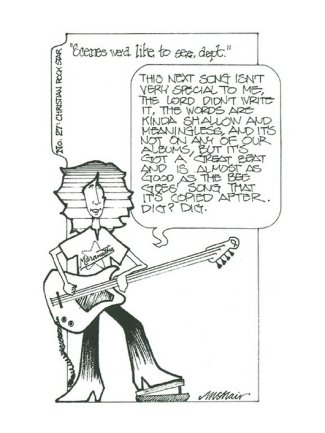I think you mistook my meaning (I worded it poorly).
The correction should read "Correction - to YOU the music did not glorify God".
That's semantically what you said before.
We cannot say whether the music we dislike or suffer with glorifies God. We can onky say that we cannot worship with that music. Just because the music of some cultures hurts my ears (actually, affects me like fingernails on a chalkboard..hurts my brain more than ears) does not mean it hurts God's ears.
I did hear the group. I am not the criteria for determining what pleases God. One person may suffer with loud music while another suffer not being able to hear quite music.
Michal criticized David for worshipping in an undignified manner, all that dancing and banging around. Just like a commoner. Not sure God saw it that way.
Yes, CCM is not rock. It is not the instruments used but how they are played.
By God being glorified I mean God's glory proclaimed in the music and God being truely worshipped by those offering the praise.
I can only respond to what is written in a post (to the words on a screen). That is the trouble with this type of communication.
Please define rock. What are the musical characteristics?
Kinda. I thought you were reading it as the music not glorifying God in your mind (you do not see it as God glorifying) as opposed to God actually being glorified (what I was trying to communicate).
Many traditional hymn music is not Glorifying God to me. But reading the lyrics I know that hymns glorifying God.
Yes, per your definition rock music includes country music, pop, blues, and R&B.
What distinguishes CCM is it's association with pop music (you would say its a sub-category of rock....but who cares what it is called).
I am specifically talking about music in worship, not driving down the road listening to tunes or going to a concert. I am talking about contemporary worship music.
The difference here is twofold - the purpose (congregational worship) and the design (designed to be accessabke to the congregation, both in playing and singing the songs).
So, you can't define rock. And again, stop putting words in my mouth. You did it again!!! I have not yet defined rock until this post.
Forgive me if I'm wrong, but you don't seem to have any music education, though you are pontificating as though you were a musician. Do you play any instrument, or sing in a choir? (Oops, sorry, contemporary churches have abandoned the choir, going to pro musicians on the stage and taking the opportunity to serve in a choir away from the average church member.)
First of all, a definition of rock. It is a genre of pop music with roots in the popular music of the 1950s. The primary instruments used are the drum set, the bass guitar and the electric guitar (usually solid body), though others may be added particularly the keyboard. The musical characteristics are: syncopation (heavy emphasis on the 2nd & 4th of 4/4 time), lots of repetition, loud volume, overly strong electric bass. (This is per a music prof, Frank Garlock, one of the first Christians to write on the genre in
The Big Beat, 1971.) It's melody is musically simplistic (no modulation, etc.), and hard rock sometimes abandons the melody. Drum solos and long riffs ("shredding") are common.
Most CCM definitely fits this definition and description. Ed Dobson was one of the first to urge CCM as an evangelistic tool in his book,
Starting a Seeker Sensitive Service (1993). He wrote, "We decided on contemporary music (Christian and non-Christian rock) led by a band composed of a lead guitar, bass guitar, synthesizer, piano, and drums..." (p. 26). See the description of rock above.
Why did Dobson abandon hymns? He purposefully adopted the world's music to reach the world. "It is the primary musical language of our target audience" (Ibid.). So he used it to get people to church on a Saturday night, but eventually his whole church went to CCM, abandoning hymns. The thing is, the Bible doesn't say, "Invite them..." but "Go...." Biblical evangelism is going out to the world to reach the world, not just inviting them to church, and certainly not tailoring your church to the lost world. "Love not the world...." The church services, by the way, are not primarily for worship (we should worship all the time), but to train the believers to minister (Eph. 4:11-12).
@John of Japan
This is my favorite worship song. You would call it rock (we know a different genre called "rock").
Not really. It doesn't have quite the right backbeat to be rock. It has an interesting double emphasis on the 1 & 3, then the 1nd & 4th notes of 4/4 time.
But it is certainly repetitive, a characteristic of rock. The words are nice, theologically correct. However, they don't hold a candle to the depth and theology of "How Great Thou Art." I mean, one verse, repeated, instead of four? Traditional hymns are much better at teaching theology.
Rather than rock, it is copying the style of the modern pop diva, in my humble but educated opinion.
Do I expect everybody to like the music? No.
Do I expect everybody to like the lyrics? Obviously not. Many will complain it is repetitive.
Some would complain that there are people leading the music.
But to say that the song does not glorify God, or that the music is inappropriate for those worshipping by singing the song is, IMHO, anti-Christian (literally, against Christians).
BTW...Christian Rock is a different genre (Demon Slayer, Skilled, Red, Thousand Foot Krutch, Cutlass, etc).
Those groups are classified as "hard rock," not just rock. There is also soft rock, folk rock, country rock, CCM rock, etc. But they all have the same musical elements.

 )
) ....
....


